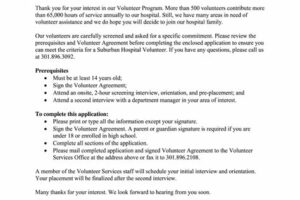Table of Contents
Interested in giving back to your community? Discover how to volunteer at a hospital and make a difference in the lives of patients and healthcare professionals. Explore various volunteer opportunities, learn about the application process, and find out how your skills and time can contribute to improving healthcare experiences. Start your rewarding journey today!
Volunteering at a hospital can be an incredibly rewarding experience, allowing you to make a tangible difference in the lives of patients and their families. Whether you are considering a career in healthcare or simply want to give back to your community, volunteering at a hospital offers a unique opportunity to gain valuable skills, expand your network, and develop a deeper understanding of the medical field. So, if you are ready to embark on this meaningful journey, let’s explore how you can become a hospital volunteer and start making a positive impact today.
The Importance of Hospital Volunteering
Volunteering at a hospital is a highly rewarding experience that allows individuals to make a positive impact on the lives of others. Hospital volunteers play a crucial role in providing support and comfort to patients, their families, and healthcare professionals. Whether your goal is to gain valuable experience in the medical field or simply give back to your community, volunteering at a hospital can be a fulfilling and meaningful endeavor.
Finding Volunteer Opportunities
Before embarking on your hospital volunteering journey, it’s important to identify the available opportunities. Begin by researching local hospitals in your area and reaching out to their volunteer services department. Many hospitals have specific requirements and application processes for potential volunteers. It’s essential to understand these guidelines to ensure a smooth and successful volunteering experience.
Completing the Application Process
Once you’ve identified a hospital where you’d like to volunteer, you’ll need to complete the application process. This typically includes filling out an application form, providing personal information, and possibly undergoing a background check. In some cases, you may also need to attend an orientation session or complete certain training modules to ensure you are well-prepared for your role as a hospital volunteer.
Exploring Different Volunteer Roles
Hospitals offer a wide range of volunteer positions to suit various interests and skill sets. Some common roles include assisting with administrative tasks, providing companionship to patients, delivering meals or snacks, transporting patients, or working in gift shops or information desks. It’s important to consider your strengths and preferences when choosing a volunteer position to ensure you can contribute effectively and enjoy the experience.
Understanding Time Commitments
Before committing to a volunteer role, it’s crucial to understand the time requirements involved. Hospitals often have specific shifts that volunteers must adhere to, and these can vary depending on the department or role. Some hospitals may expect volunteers to commit to a certain number of hours per week or month, while others may offer more flexible options. Consider your availability and commitments outside of volunteering to ensure you can meet the hospital’s expectations.
Developing the Necessary Skills
While prior medical knowledge or experience is not always required, developing certain skills can enhance your effectiveness as a hospital volunteer. Excellent communication skills, empathy, and the ability to remain calm under pressure are invaluable attributes for anyone working in a healthcare setting. Additionally, being detail-oriented, reliable, and respectful towards patients and staff will help create a positive and supportive environment.
Adhering to Dress Code and Professionalism
Hospitals have strict dress codes to maintain a professional atmosphere and ensure the safety and well-being of patients and staff. As a volunteer, it’s important to adhere to these guidelines and dress appropriately for your role. This may include wearing a uniform provided by the hospital or simply following specific attire recommendations. Always remember to maintain professionalism in your interactions with patients, families, and hospital staff.
Reaping the Rewards
Volunteering at a hospital offers numerous personal rewards beyond the satisfaction of helping others. It allows individuals to gain insight into the healthcare field, develop new skills, and build meaningful relationships with patients and healthcare professionals. Additionally, volunteering can be a valuable addition to your resume, showcasing your dedication, compassion, and commitment to serving others.
Seeking Support and Guidance
Throughout your hospital volunteering experience, it’s essential to seek support and guidance when needed. Hospitals usually have volunteer coordinators or supervisors who can address any concerns or questions you may have. These individuals can provide guidance on how to navigate challenging situations, offer resources for personal and professional development, and ensure you have a fulfilling and positive experience as a hospital volunteer.
Appreciating Your Impact
Finally, always remember the impact you make as a hospital volunteer. Your presence and support can brighten the lives of patients and their families during their time of need. Even the smallest gestures, such as offering a listening ear or a comforting smile, can have a profound effect. Your commitment to volunteering at a hospital is invaluable and greatly appreciated by patients, healthcare professionals, and the community as a whole.
A Guide on How to Volunteer at a Hospital
Volunteering at a hospital offers a unique opportunity to make a positive impact on the lives of patients and their families. Whether you aspire to pursue a career in healthcare or simply want to give back to your community, becoming a hospital volunteer is an excellent way to contribute. In this guide, we outline steps you can take to embark on a fulfilling volunteering journey at a hospital.
Research Hospital Volunteer Programs
To begin your volunteering journey at a hospital, it is crucial to first research and identify suitable programs in your area. Reach out to different hospitals, nursing homes, or other medical institutions, and inquire about their specific volunteer opportunities and requirements. Familiarize yourself with the different roles available to find the one that aligns with your interests and skills.
Understand the Application Process
Volunteering at a hospital often involves a formal application process. Obtain an application form from the hospital’s volunteer services department or download it from their website. Carefully fill out all necessary details, including your personal information, availability, and reasons for wanting to volunteer. Attach any required documents, such as a resume or reference letters, and submit your application within the specified deadline.
Complete Background Checks and Clearance
Due to the sensitive nature of healthcare environments, most hospitals require volunteers to undergo background checks and clearance processes. These are designed to ensure the safety and security of patients, staff, and volunteers alike. You may be asked to provide personal references and consent to a criminal background check or drug screening. Prepare yourself for these requirements and be honest and transparent throughout the process.
Attend Volunteer Orientation
Once your application has been accepted, you will likely be invited to attend a volunteer orientation session. These sessions are designed to familiarize you with the hospital’s policies, procedures, and expectations. You may learn about HIPAA regulations, infection control protocols, and the appropriate way to interact with patients. Take this opportunity to ask any questions you may have and get a feel for the hospital’s culture and values.
Benefit from Relevant Training and Education
Hospital volunteer programs often provide training and education opportunities to equip volunteers with the necessary skills and knowledge. Depending on the role you choose, you might receive training in CPR, first aid, communication techniques, or specialized programs related to the department you will be working in. Embrace these learning opportunities as they will enhance your volunteering experience and contribute to the overall well-being of patients.
Embrace Flexibility and Humility
Volunteering at a hospital requires a flexible mindset and the ability to adapt to different situations. Be prepared to assist with a wide variety of tasks, such as delivering meals, comforting patients, supporting administrative staff, or assisting healthcare professionals. Approach every task with humility and respect, understanding that each interaction has the potential to brighten someone’s day and positively impact their healing journey.
Show Commitment and Reliability
Consistency is key when it comes to hospital volunteering. Make an effort to fulfill the commitment you have made to the hospital and be reliable with your attendance. Hospitals rely on their volunteers to maintain continuity and provide support, so it’s important to show up on time, communicate any schedule changes promptly, and maintain a professional attitude throughout your volunteering experience.
Reflect and Celebrate Your Contributions
After volunteering for a certain period, take a moment to reflect on your experiences and the impact you’ve made. Consider keeping a journal or documenting memorable moments to remind yourself of the difference you have made in the lives of patients and their families. Celebrate your contributions by sharing your volunteer stories with others, thereby inspiring individuals in your community to partake in the journey of hospital volunteering.
Conclusion
Volunteering at a hospital is an incredible opportunity to make a meaningful difference in the lives of those in need. By following the steps outlined in this guide, you will be well-prepared to embark on a fulfilling volunteering journey, providing comfort, support, and positivity to patients and their loved ones while gaining valuable insights into the world of healthcare.
Volunteering at a hospital can be an incredibly rewarding experience, allowing individuals to make a positive impact on the lives of patients and their families. If you are considering becoming a hospital volunteer, here is a step-by-step guide to help you get started:
- Research local hospitals: Begin by researching different hospitals in your area. Look for those that have volunteer programs and find out more about their requirements and application process.
- Complete the application: Once you have selected a hospital, fill out their volunteer application form. This typically includes personal information, availability, and any specific areas of interest or skills you may have.
- Attend an orientation: If accepted as a volunteer, you will usually be required to attend an orientation session. During this session, hospital staff will provide you with important information about policies, procedures, safety measures, and confidentiality regulations.
- Undergo background checks: Many hospitals require volunteers to undergo background checks, including criminal record checks and immunization verification. These checks ensure the safety and well-being of patients.
- Receive training: Depending on the volunteer role you choose, you may need to undergo specialized training. This could involve learning about infection control, patient communication, or basic first aid techniques. Training equips volunteers with the necessary skills to fulfill their duties effectively.
- Choose your area of service: Hospitals offer a wide range of volunteer opportunities, such as assisting in patient transport, providing companionship to elderly patients, helping with administrative tasks, or even working in the gift shop. Select an area that aligns with your interests and availability.
- Follow hospital guidelines: Once you start volunteering, it is crucial to adhere to the hospital’s rules and regulations. This includes maintaining patient confidentiality, respecting cultural differences, and following proper hygiene practices to prevent the spread of infections.
- Commit to a schedule: Hospitals rely on their volunteers to be consistent and reliable. Determine a schedule that suits your availability and commit to it. This demonstrates your commitment and ensures that you can fulfill your responsibilities effectively.
- Engage with patients and staff: As a hospital volunteer, you will have the opportunity to interact with patients, their families, and the hospital staff. Approach each interaction with empathy, kindness, and respect. Listening to patients’ stories and offering a comforting presence can make a significant difference in their healing process.
- Reflect and learn from the experience: Volunteering at a hospital can be emotionally challenging, but also incredibly rewarding. Take time to reflect on your experiences and learn from them. Engage in self-care activities to ensure you are maintaining your well-being while providing support to others.
By following these steps and embracing the journalist voice and tone, individuals can embark on a fulfilling journey as hospital volunteers, contributing to the well-being and comfort of those in need.
Thank you for visiting and taking the time to read our article on how to volunteer at a hospital. We hope that the information provided has been helpful and insightful for those who are interested in giving back to their community in this meaningful way. Volunteering at a hospital is not only a great way to contribute to the well-being of others but also an opportunity for personal growth and learning.
First and foremost, it is important to understand that volunteering at a hospital requires dedication, compassion, and a genuine desire to help others. It is crucial to have a strong sense of empathy and respect for the patients and staff you will encounter during your time as a volunteer. Hospital environments can be challenging, emotionally charged, and sometimes overwhelming, so having the right mindset is essential.
When considering becoming a hospital volunteer, it is advisable to start by researching different hospitals in your area. Look for volunteer programs that align with your interests and goals. Some hospitals offer specific programs for volunteers, such as working with children, the elderly, or supporting administrative tasks. Once you have identified a hospital that suits your preferences, reach out to their volunteer coordinator to express your interest and inquire about the application process.
After submitting your application, you may be required to attend an orientation session or interview to further assess your suitability as a volunteer. This is an excellent opportunity for you to ask any questions you may have about the role and responsibilities. It is crucial to be open and honest about your strengths, limitations, and availability during this process. Hospitals value volunteers who can commit to a regular schedule and demonstrate reliability.
In conclusion, volunteering at a hospital is a rewarding experience that allows individuals to make a positive impact in the lives of patients and their families. By following the steps outlined in this article, you can embark on a journey of service that will not only benefit others but also provide you with valuable skills and personal growth. Remember, volunteering is a commitment, so it is essential to approach it with enthusiasm, dedication, and a genuine passion for helping others.
Thank you once again for visiting our blog, and we hope to have inspired you to take the first step towards volunteering at a hospital. Together, we can create a community that supports and uplifts one another through acts of kindness and compassion.
.
How To Volunteer At Hospital:
What are the requirements to volunteer at a hospital?
Volunteering at a hospital usually requires meeting certain requirements, such as:
- Minimum age requirement: Most hospitals set a minimum age limit for volunteers, often ranging from 16 to 18 years old.
- Background check: Due to the sensitive nature of healthcare settings, hospitals typically conduct background checks on potential volunteers to ensure the safety of patients and staff.
- Health screenings: Some hospitals may require volunteers to undergo health screenings, including vaccinations, to minimize the risk of spreading infections.
- Training: Depending on the role, volunteers may be required to complete training sessions or orientation programs to familiarize themselves with hospital policies and procedures.
What kind of tasks can I expect to perform as a hospital volunteer?
As a hospital volunteer, you may be assigned various tasks based on your skills and the hospital’s needs. Some common tasks include:
- Assisting visitors: Greeting and directing visitors, providing them with information, and helping them navigate the hospital.
- Supporting patients: Engaging in conversation, offering companionship, and providing emotional support to patients who may be feeling lonely or anxious.
- Helping with administrative tasks: Assisting with paperwork, filing, answering phone calls, and organizing medical records.
- Delivering supplies: Transporting equipment, medication, and other supplies throughout the hospital as needed.
- Assisting healthcare professionals: Supporting nurses, doctors, and other staff members with non-medical tasks, such as running errands or fetching items.
Can volunteering at a hospital lead to a career in healthcare?
Volunteering at a hospital can provide valuable exposure to the healthcare field and help individuals gain insight into various medical professions. While it does not guarantee a career in healthcare, it can be a stepping stone for those considering a healthcare-related career path. Volunteering allows you to observe healthcare professionals, learn about different roles, and develop essential skills that could be beneficial in future healthcare endeavors.
Are there any restrictions on the number of hours I can volunteer at a hospital?
The number of hours you can volunteer at a hospital may vary depending on the specific hospital’s policies and your availability. Some hospitals may have minimum hour requirements, while others may allow volunteers to choose their preferred shift lengths. It is best to inquire with the hospital’s volunteer services department to get accurate information regarding the number of hours you can volunteer.
How do I apply to become a hospital volunteer?
To apply for a volunteer position at a hospital, follow these general steps:
- Contact the hospital: Reach out to the hospital’s volunteer services department to express your interest in volunteering and to inquire about the application process.
- Complete the application: Fill out the volunteer application form provided by the hospital. This form usually asks for personal information, availability, skills, and interests.
- Attend an interview: If selected, you may be invited for an interview to discuss your motivations, availability, and potential roles within the hospital.
- Complete any required training: Once accepted, you may need to complete any necessary training or orientation programs before starting your volunteer work.
- Begin volunteering: After completing the application process and any required training, you will be ready to start your volunteer work at the hospital.
Remember to check the specific requirements and procedures of the hospital you are interested in volunteering at, as they may vary. Volunteering at a hospital can be a rewarding experience, providing an opportunity to make a positive impact on the lives of patients and contribute to the healthcare community.






